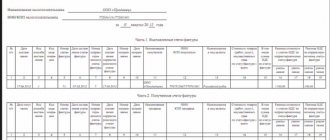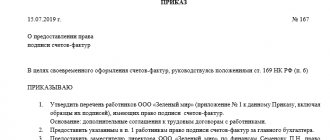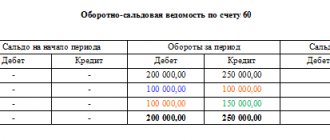What to do if you forgot to submit a document for sale?
Often, in the process of documenting transactions, some inconsistencies may occur, documents may not be drawn up or drawn up incorrectly, in such situations it is necessary to take additional actions in order to resolve this situation. Otherwise, tax deductions will not be received, since the main basis for this is a correctly drawn up document.
The transaction must be carried out in accordance with legal regulations . What to do if you forgot to post a document from the supplier in a timely manner?
If a discrepancy or absence of an invoice is identified, it is necessary to immediately draw up this document in accordance with the rules and provide it to the buyer within 5 days from the date of its preparation.
The invoice must indicate the exact date of the transaction; in addition, a certificate of completion of work is drawn up, which, together with the invoice, is sent to the customer’s address. This act is also drawn up on the date of the actual transaction. Read more about whether an invoice and a work completion certificate are interchangeable here, and find out more about the rules for issuing a power of attorney for signing invoices and work completion certificates in this material.
VAT deductions can be carried forward to subsequent quarters without risk
The company has the right to claim a VAT deduction within three years after it has registered goods, work or services. Since January 1, 2015, such rules have been established in tax legislation (clause 1.1 of Article 172 of the Tax Code of the Russian Federation).
Thus, it has become safe to carry forward VAT deductions to subsequent quarters. For example, deductions can be deferred so you don't have to claim a tax refund on your return. Or if the company is trying to stick to a safe percentage of deductions.
Previously, tax authorities believed that VAT should be deducted only in the period in which all the necessary conditions were met: the company received an invoice and registered the goods. To claim a deduction later, you need to submit an updated declaration (letter of the Federal Tax Service of Russia dated March 30, 2012 No. ED-3-3/1057).
In practice, the supplier's invoice often arrives at the company after the end of the quarter in which the goods were registered. However, it is safer to calculate the period within which tax deductions can be transferred from the registration of goods. Since this is exactly the rule stated in the Tax Code of the Russian Federation. Any other approach will result in additional tax charges.
But these amendments apply only to two types of deductions. The first is the deduction of tax imposed by suppliers of goods, works or services. The second is the deduction of VAT, which the company pays when importing goods (clause 2 of Article 171 of the Tax Code of the Russian Federation). It is risky to carry over other deductions to subsequent quarters. This applies, for example, to VAT amounts that are deducted by tax agent companies.
In addition, the three-year period does not apply if the buyer returns the goods or if the supplier returns the advance payment to the client. In this case, the seller has the right to deduct previously accrued VAT within a year after the buyer returns or refuses the goods (clause 4 of Article 172 of the Tax Code of the Russian Federation).
If it is not registered
Sometimes unplanned situations may occur that need to be corrected. So, if, nevertheless, the invoice arrived on time, but they forgot to register it in accordance with the rules, then this fact cannot be ignored.
If an unregistered invoice is found, it should still be entered into the sales book or purchase book for the period to which it relates. The question also arises in terms of the fact that the next reporting period has arrived and what to do now? How to post a document for the previous period? You can register an invoice even in the upcoming reporting period .
There are no fines or other sanctions for this from the tax authorities. As for the seller in this matter, nothing will happen to him, neither good nor bad, from the fact that he did not exhibit or register this document on time.
As for the buyer, he may be denied VAT deduction. If the document is drawn up correctly and the actual date of the transaction is indicated, the chances that everything will go as expected are quite high.
Read more about the features of registering and storing invoices at an enterprise here.
Instructions for carrying out
The registration procedure is significantly different, both for the seller and the buyer, and based on the quarter in which the corrected invoice was drawn up (we discussed why an invoice is needed for the seller and the buyer here). For sellers, subclause 3 of clause 11 of the Sales Book Maintenance Rules provides the following template for making changes:
- If the preparation of an erroneous invoice occurred in the same billing period in which the cancellation sheet was registered, that is, the dates of lines 1 and 1a are within the same quarter, the original document is registered again.
- If cancellation occurs on an erroneous invoice already in the next quarter, based on the date in lines 1 and 1a of the corrected version, then an additional sheet is drawn up, in accordance with paragraph 3 of the Rules for filling out additional invoices. sheets.
Correction algorithm:
- The primary invoice is re-registered, with columns 13a-19 filled in with negative indicators, removed from the invoice with the “-” sign.
- The corrected version is registered in the prescribed manner, indicating in column 4 details 1a from the previous version.
The buyer, in accordance with subparagraph 4 of paragraph 9 of the Rules for maintaining the purchase book, cancels and re-registers a new invoice, in a manner that depends on the date of the corrections by the seller.
If the erroneous and corrected invoices are drawn up in the same quarter:
- An erroneous invoice is re-registered by entering negative indicators in columns 15-16.
- The corrected version is registered in the standard way, duplicating the date and number 1a in line 4.
If the seller did not have time to submit the corrections in the billing quarter, and the data has already been transferred to the tax service, the procedure is slightly different. An additional sheet is inserted into the new purchase book in accordance with paragraph 5 of the filling rules, in a similar way with the correction of the columns of the erroneous invoice.
How to conduct it if it arrives late?
Entrepreneurs who are VAT payers have the right to deduct this tax from the value of acquired property used in business. To implement this deduction, you will need correctly executed invoices from suppliers or contractors.
Any use of materials is permitted only with a hyperlink . If the invoice arrived later, then it must be registered in the reporting period in which the transaction took place.
The main feature that inspectors may not like is the violation of the numbering of documents in the purchase or sales book. But it is worth noting right away that this will not entail any undesirable consequences.
Can the document be accepted next quarter? Options for the development of events if the invoice arrives late :
- It can be accepted retroactively, but in this case the numbering of documents is violated. The buyer has a greater chance of receiving a VAT deduction.
- A document can be registered with the current date, but the deadlines for issuing such invoices are violated. Although there are no sanctions for such violations.
If the document arrived late, then you should try to contact the tax service in order to receive a tax deduction, but no one can give you a 100 percent guarantee that you will receive it.
If the invoice is issued next month
If the date of the act of services rendered and the date of the invoice fall in different months, is this a violation? Experts from the Legal Consulting Service GARANT Ekaterina Lazukova and Sergey Rodyushkin explain. Services provided in one month and invoice issued in the next month. Is this a violation? Based on clause 3 of Art. 168 of the Tax Code of the Russian Federation, when selling goods (work, services), the corresponding invoices are issued no later than five calendar days, counting from the day of shipment of the goods (performance of work, provision of services). Thus, the deadline for issuing invoices is calculated from the date of shipment of goods (performance of work, provision of services). The Tax Code of the Russian Federation does not define the concept of the date of shipment of goods (performance of work, provision of services). The authorized bodies provide the following explanations: in letters of the Federal Tax Service of Russia dated 04/11/2012 N ED-4−3/ [email protected] and dated 02/28/2006 N MM-6−03/ [email protected] it is noted that the date of shipment (transfer) of goods (works, services) is recognized as the date of the first drawing up of the primary document issued in the name of the buyer (customer) or carrier. The Financial Department expresses a similar point of view (see, for example, letter of the Ministry of Finance of Russia dated March 23, 2012 N 03−07−11/80). The letter of the Ministry of Finance of Russia dated 01.03.2012 N 03−07−08/55 states that for the purposes of applying VAT, the date of shipment of goods is the date of the first drawing up of the primary document issued in the name of the buyer or carrier (communication organization) for the delivery of goods to the buyer. Let us recall that a primary accounting document is a supporting document with which an organization formalizes each completed business transaction (Part 1, Article 9 of the Federal Law of December 6, 2011 N 402-FZ “On Accounting” (hereinafter referred to as Law N 402-FZ). Primary an accounting document must be drawn up when a fact of economic life is committed, and if this is not possible, immediately after its completion (Part 3 of Article 9 of Law No. 402-FZ). An invoice is not a primary accounting document. It is used only for the purposes of the chapter 21 of the Tax Code of the Russian Federation and serves as the basis for the buyer to accept the presented amounts of VAT for deduction in the manner prescribed by the specified chapter (clause 1 of Article 169 of the Tax Code of the Russian Federation). In this regard, invoices for services rendered are issued by the seller no later than five calendar days, counting from the date of drawing up the act of services rendered (note that in the letter dated 02/17/2011 N 03−07−08/44, the Ministry of Finance of Russia draws the attention of taxpayers that cannot be the basis for deducting VAT invoices issued before the preparation of primary documents , confirming the shipment of goods (works, services)). Therefore, if in the situation under consideration, less than 5 days have passed between the date of issuing the act of services provided and the date of issuing the invoice, for example, the act was signed on November 30, 2012, and the invoice was issued on December 3, 2012, there are no violations. It does not matter that the date of the act of services rendered and the date of the invoice fall in different months. In this case, VAT on such an invoice should be deducted in December 2012 (Article 171 and Article 172 of the Tax Code of the Russian Federation). Tax legislation does not provide for liability for violation of deadlines for issuing invoices. However, due to a violation of the deadline for issuing an invoice by the seller of goods (works, services), problems may arise for the taxpayer claiming to deduct VAT amounts on the basis of such an invoice. In other words, if the difference between the dates in question is more than 5 days, then it is quite possible that the tax authorities may make claims regarding the discrepancy between the dates of the primary document and the invoice. In such a situation, the requirements of tax legislation are actually violated, so the tax authorities in this case may deny the organization the right to deduct VAT. Nevertheless, we believe that it is possible to deduct VAT on such an invoice. In accordance with paragraph 2 of Art. 169 of the Tax Code of the Russian Federation, invoices are the basis for accepting tax amounts presented to the buyer by the seller for deduction when the requirements established by clauses are met. 5, 5.1 and 6 art. 169 of the Tax Code of the Russian Federation. At the same time, errors in invoices that do not prevent the tax authorities from identifying the seller, buyer of goods (work, services), property rights, the name of goods (work, services), property rights, their value, as well as the tax rate and amount when conducting a tax audit tax presented to the buyer are not grounds for refusal to accept tax amounts for deduction (second paragraph of clause 2 of Article 169 of the Tax Code of the Russian Federation). Arbitration practice is also consistent with this point of view (see, for example, decisions of the FAS Volga District dated 09/08/2010 in case No. A55−14066/2009, FAS Moscow District dated October 31, 2008 N KA-A40/10352−08, FAS North Caucasus District dated 08/24/2009 N A53−19676/2008−C5−23 (by the decision of the Supreme Arbitration Court of the Russian Federation dated 12/17/2009 N VAS-16581/09, the transfer of this case for review in the order of supervision was refused)).
rnk
What will happen if there is no paper?
In accordance with Article 168 of the Tax Code, paragraph 3, an invoice must be drawn up within five days from the date of the purchase and sale transaction. If the listing does not occur, then it turns out that the seller is violating the law, although as for sanctions for this violation, they are not provided.
The best option is to detect the discrepancy in the same reporting period. If the absence of a document is discovered later, problems will arise with VAT deductions . The seller will suffer much less here.
For more details about why an invoice is needed for both sellers and buyers, read this material.
Why is cancellation necessary?
There are few situations when it is necessary to cancel an issued invoice. The main reasons are erroneous issuance of a shipping invoice and incorrect details that affect the deduction of VAT. In such cases, one of the parties will cancel and re-issue the invoice.
If you need to update the cost, price or volume of a product, service or work, cancellation is not required, since changes in tax liabilities can be reflected in the sales and purchases ledger. Cancellation is provided to replace an invoice that cannot be adjusted. We talked about the adjustment invoice here.
What to expect when applying “retroactively”?
If you forgot about the invoice and remembered it in the next quarter, then it is advisable to post the document “backdated” so as not to violate the invoicing procedure. The legislation does not provide for a procedure for dealing with such violations, so management must determine it in the accounting policies of the enterprise. If the document is not received on time, the buyer risks more than the seller.
For backdating registration, the seller only faces a violation of tax laws, for which there are no sanctions. The buyer will have to fight for his right to receive tax deductions, right up to court proceedings.
There are more materials about invoices on our website:
- What is a power of attorney to sign and how to issue it?
- Features of filling out and submitting an invoice for KS-2 and KS-3 and sample documents.
- Who issues the document?
- What is the difference between an invoice and an invoice?
- What is an invoice and an invoice, what is the difference between these documents, and how to fill them out?
- Is it possible to accept a zero invoice?
- What is an invoice and a universal transfer document?
- In what cases and when are invoices and delivery notes issued?
- Is there a stamp on the document?
New position of the financial department
The Tax Code still does not contain a direct rule allowing the deduction to be applied in parts - it only clearly allows it to be declared in tax periods within three years after the goods are accepted for accounting. However, now that flexible options for managing the deduction have appeared, the ban on its fragmentation loses all meaning . The position of Ministry of Finance officials has changed, which is reflected in letters No. 03-07-11/20290 and No. 03-07-11/20293 dated April 9, 2015. They conclude that splitting the VAT deduction for one invoice into several tax periods generally does not contradict the Tax Code.
The exception is transactions for the acquisition of fixed assets, equipment for installation and intangible assets - on the basis of paragraph 1 of Article 172 of the Tax Code of the Russian Federation, VAT on them is deducted in full after the said assets are accepted for accounting. In addition, splitting the deduction into several periods is unacceptable for VAT paid as a tax agent, as well as calculated from payment, prepayment and certain other transactions.








